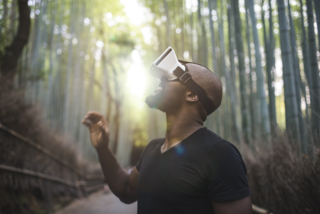Anxiety
Video and Virtual Reality Show Promise for Those With Anxiety and Distraction
A recent study finds nature imagery can reduce anxiety in health care workers.
Posted April 19, 2022 Reviewed by Michelle Quirk
Key points
- Guided experiences through nature using video on computers or VR headsets can improve anxiety, emotional distress, and focus.
- When the experiences relieve anxiety and overwhelm, focus improves too, which can then improve anxiety.
- Although video and VR may both be helpful, VR may show slight superiority due to the immersive experience.

On April 2, 2022, the Mayo Clinic published a study in the Journal of Primary Care and Community Health that described findings from a pilot trial that found that 10-minute video and virtual reality (VR) journeys through nature led to statistically significant improvements in anxiety, emotional distress, and focus, in frontline health care workers during the COVID-19 pandemic. Although participants in both the video and VR experiences showed statistically significant improvements in all three parameters, the VR experiences showed greater numerical improvement in anxiety than the video experiences.
Prevalence of Anxiety
As the authors pointed out in their paper, up to 33.7 percent of the population is or will be affected by an anxiety disorder during their lifetime. And in frontline health care providers, the overall prevalence of anxiety and depression was close to 25 percent, while 25 percent of nurses, 17 percent of medical doctors, and 43 percent of frontline workers all experienced significant levels of anxiety. Any solution for anxiety and burnout would be welcome in these populations.
Prior studies have demonstrated that anxiety may be associated with feeling overwhelmed, and when this happens, you can see this impact on the brain. But it's not just the emotion of anxiety that is troubling, though that is certainly very disruptive. When the brain is under siege, your thinking can suffer, too, because anxiety can disrupt attention, making it difficult to focus to get through the day. This makes sense because, in the brain, circuits that process anxiety communicate with the circuits responsible for focused attention.
Nature-Based Guided Imagery
So, the Mayo Clinic researchers led by Dr. Ivana Croghan used video delivered through computers or VR headsets that were designed to address both overwhelm and disturbed attention. They found that both of these aspects of anxiety improved after just 10 minutes of downshifting into a relaxed and designed nature experience. While the authors pointed out that this was a preliminary study, they also shared that the participants liked the experiences so much that 96 percent of them said they would do it again or recommend it, and 23 out of 24 people said that they felt relaxed after watching the imagery.
In the calming imagery, the participants walked through the woods. They looked at peaceful scenery and were guided by a narrator who encouraged them to breathe, notice the animals walking by, and look up at the sky. In the imagery designed to improve focus, the participants gently focused on logs in a fire, fireflies, and fish as they went on a journey up a mountain, also guided by a narrator.
Nature-based guided imagery has been previously shown to reduce anxiety. And computer-generated imagery (CGI) has been shown to be superior to actual video of nature in reducing anxiety. This study added to prior findings by showing that anxiety can be reduced by focus, and focus can be improved when you become calmer.
Viewing nature can have positive effects on cerebral and autonomic nervous activities. It's a form of positive distraction. And when you're stuck at home and unable to roam around, or when you feel constrained in your movement and psychologically tense, the feeling of moving about in VR can provide a much-needed therapeutic benefit. Also, when you're stuck at work, prior research shows that a brief VR reprieve can provide just the sense of enhanced well-being you may be looking for.
Separate from the visual experience of watching nature, VR also provides a feeling of immersion that has a different impact on the brain. It makes people attend differently, and it also engages the brain in making mental models of the environment that are different than if one were just looking at a photograph, or even looking at a video.
As the authors said, this study was a pilot study and provided preliminary results. But, in their words, the findings provide "much promise," especially for those in need.


